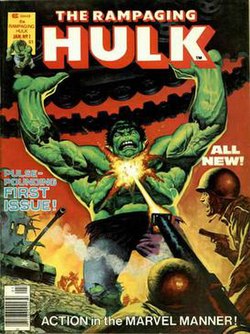The Rampaging Hulk
| The Rampaging Hulk | |
|---|---|

The cover to The Rampaging Hulk #1 (Jan. 1977), art by Ken Barr.
|
|
| Publication information | |
| Publisher | Curtis Magazines (Marvel Comics) |
| Schedule | Bimonthly |
| Format | Ongoing series |
| Genre | |
| Publication date | January 1977 – June 1981 |
| Number of issues | 27 |
| Main character(s) | The Hulk |
| Creative team | |
| Writer(s) | |
| Penciller(s) | |
| Inker(s) |
List
|
| Editor(s) | David Anthony Kraft, Rick Marschall |
| Collected editions | |
| Essential Rampaging Hulk Vol. 1 | |
| Essential Rampaging Hulk Vol. 2 | |
The Rampaging Hulk is a black and white magazine published by Curtis Magazines (an imprint of Marvel Comics) from 1977–1978. With issue #10, it changed its format to color, and title to The Hulk!, and ran another 17 issues before it folded in 1981. It was a rare attempt by Marvel to mix their superhero characters with the "mature readers" black-and-white magazine format.
With the change to color and the title to The Hulk!, the magazine became Marvel's attempt to cash in on the popularity of The Incredible Hulk TV series, starring Bill Bixby and Lou Ferrigno, both of whom were prominently featured and interviewed over the course of the magazine's run, as was executive producer Kenneth Johnson.
The Rampaging Hulk ran for nine issues from January 1977 to June 1978. With issue #10 (Aug. 1978), the bi-monthly magazine changed its title to The Hulk! and became a full-color book utilizing "Marvelcolor".
The magazine featured fully painted covers by such artists as Ken Barr, Earl Norem, and Joe Jusko. Norem's work on the series includes a darkly-lit close-up of the Hulk's face, gritting his teeth with his knuckles raised, done for The Hulk! #17 (Oct. 1979).
Artists such as Walt Simonson,John Buscema, Howard Chaykin, John Romita Sr., John Romita Jr. (doing some of his first professional work), Keith Pollard, Jim Starlin, Joe Jusko, Bill Sienkiewicz, Val Mayerik, Herb Trimpe, Brent Anderson, and Gene Colan provided interior artwork; while writers such as Starlin, Doug Moench,Roger Stern, Dennis O'Neil, and Archie Goodwin took on the scripting chores.
...
Wikipedia
